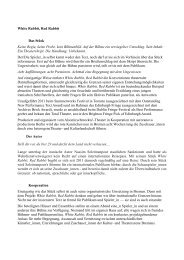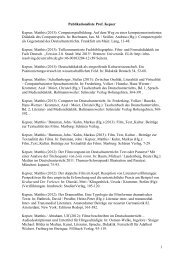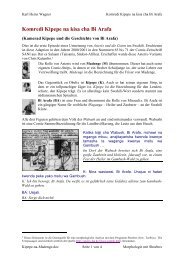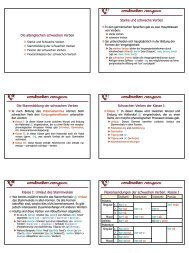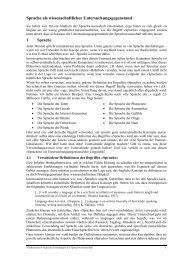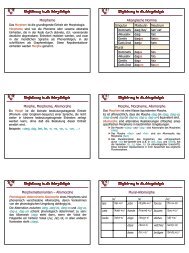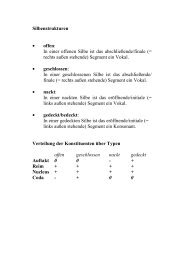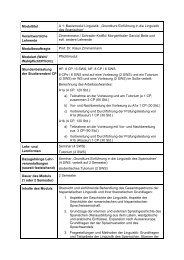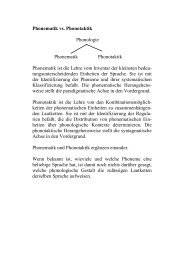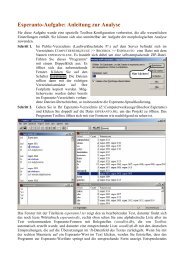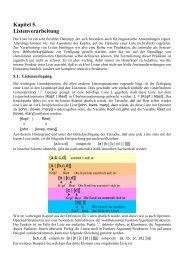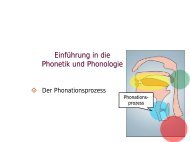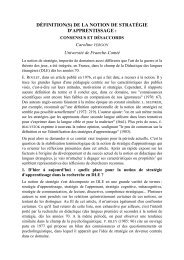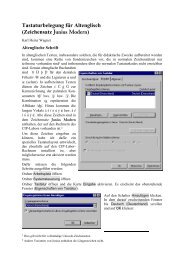Relativism and Universalism in Linguistics - Fachbereich 10 ...
Relativism and Universalism in Linguistics - Fachbereich 10 ...
Relativism and Universalism in Linguistics - Fachbereich 10 ...
You also want an ePaper? Increase the reach of your titles
YUMPU automatically turns print PDFs into web optimized ePapers that Google loves.
38 Sections<br />
14:30–15:00 Wischer, Ilse (University of Potsdam)<br />
The Grammaticalisation of Will- <strong>and</strong> Shall-Futures <strong>in</strong> Middle English<br />
Reconceptualization of Spatial Relations<br />
Bogdanova, Svetlana<br />
Irkutsk State L<strong>in</strong>guistic University, Russia<br />
rusjap@mail.ru<br />
Every language has a set of means to characterize spatial relations. It is universal. However,<br />
the languages of the world differ widely <strong>in</strong> their treatment of space (G.A.Miller, Ph. Johnson-<br />
Laird). Thus, phrasal verbs <strong>in</strong> the English language are considered to be a typologically<br />
relevant phenomenon. Such means can be called language specific.<br />
A limited number of spatial elements <strong>in</strong> any language, caused by the peculiarities of the<br />
human perception of space, help l<strong>in</strong>guists to trace their group<strong>in</strong>gs <strong>and</strong> def<strong>in</strong>e the ma<strong>in</strong><br />
directions of shifts of mean<strong>in</strong>gs. Spatial elements (spatial prepositions, particles, prefixes,<br />
etc.) show a tendency to develop metaphorical mean<strong>in</strong>gs by extend<strong>in</strong>g their direct spatial<br />
mean<strong>in</strong>gs. The extended mean<strong>in</strong>gs can describe some other spheres of activities, <strong>in</strong>clud<strong>in</strong>g<br />
mental activity. Our comprehension of complicated <strong>and</strong> abstract entities <strong>and</strong> events of the<br />
surround<strong>in</strong>g world is grounded ma<strong>in</strong>ly on basic spatial dimensions, which are simple, their<br />
number is limited as well as the number of describ<strong>in</strong>g them spatial adverbs, prepositions,<br />
prefixes, etc. These elements can be used <strong>in</strong> several cognitive doma<strong>in</strong>s both <strong>in</strong> direct <strong>and</strong><br />
metaphorical mean<strong>in</strong>gs.<br />
It is possible to differentiate two levels of knowledge structur<strong>in</strong>g: conceptualization <strong>and</strong><br />
reconceptualization. In the process of conceptualization direct spatial mean<strong>in</strong>gs are formed<br />
with the possibility of their further metaphorization. The oppositions of spatial particles <strong>in</strong><br />
English <strong>and</strong> spatial prefixes <strong>in</strong> Russian are observed: up-down; ahead-back; <strong>in</strong>-out; on-off;<br />
войти-выйти(come <strong>in</strong> – go out); спрыгнуть-запрыгнуть (jump down – jump up), etc. In<br />
the process of reconceptualization particles <strong>and</strong> prefixes <strong>in</strong> metaphorical (extended) mean<strong>in</strong>gs<br />
comb<strong>in</strong>e <strong>in</strong>to group<strong>in</strong>gs, because practically every event can be described from different<br />
po<strong>in</strong>ts of view. The peripheral mean<strong>in</strong>g of one spatial element can be connected with the<br />
peripheral mean<strong>in</strong>g of the other spatial element, as a result of this merg<strong>in</strong>g there comes a<br />
group<strong>in</strong>g of their metaphorical mean<strong>in</strong>gs, which is a productive derivational model both <strong>in</strong><br />
English <strong>and</strong> <strong>in</strong> Russian. Thus, <strong>in</strong> some contexts the particles out, down, off can have rather<br />
close mean<strong>in</strong>gs <strong>and</strong> together they can characterize the cognitive doma<strong>in</strong>s of ‘tiredness’,<br />
‘cool<strong>in</strong>g’. E.g. wear out – wear down – wear off; cool down, cool off, cool out, etc. The same<br />
phenomenon of reconceptualization we can observe <strong>in</strong> Russian: <strong>in</strong> some contexts verbs with<br />
different spatial prefixes have practically the same mean<strong>in</strong>g. E.g. rus. обогнать – перегнать<br />
(come first), выжидать – пережидать (wait for some time), побить – избить (beat smb up),<br />
уронить – выронить (drop smth), colloq. утворить – вытворить – натворить (do smth<br />
wrong), выгнать – прогнать (send off), въехать – заехать (drive <strong>in</strong>to), etc.<br />
The group<strong>in</strong>gs of spatial elements reflect the processes of conceptualization <strong>and</strong><br />
reconceptualization of spatial relations. Phrasal verbs <strong>in</strong> English <strong>and</strong> prepositional verbs <strong>in</strong><br />
Russian illustrate the peculiarities of the l<strong>in</strong>guistic categorization of the world, caused by the<br />
human cognitive activity. They also illustrate the tendency <strong>in</strong> both languages to comb<strong>in</strong>e<br />
spatial elements with extended mean<strong>in</strong>gs <strong>in</strong>to group<strong>in</strong>gs to characterize some def<strong>in</strong>ite<br />
cognitive doma<strong>in</strong>s.



